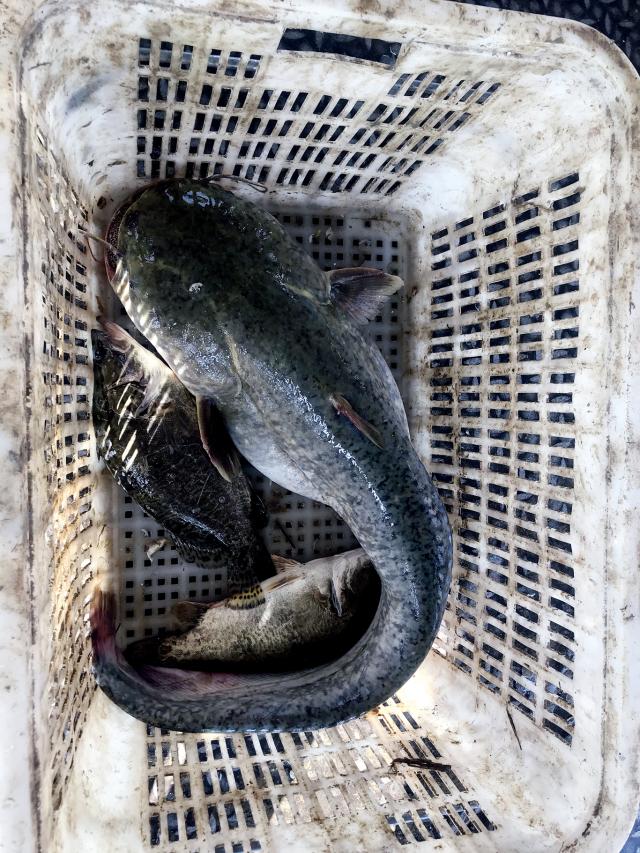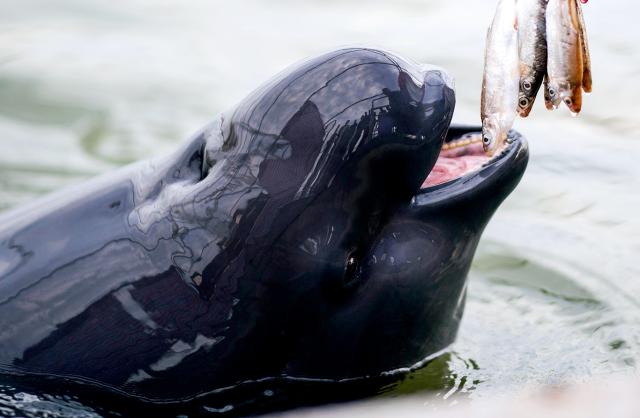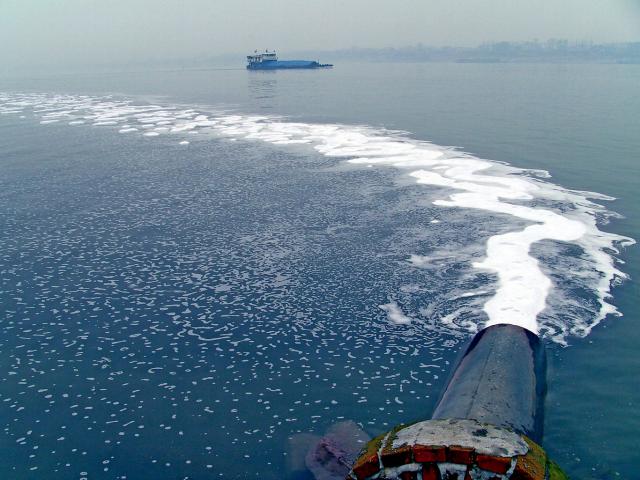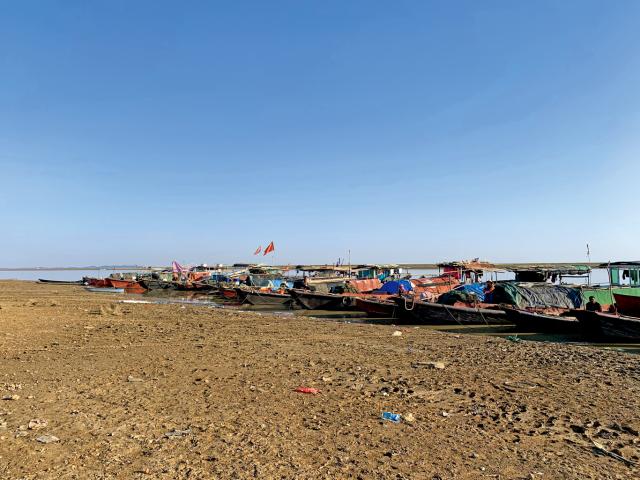Fishermen affected by the ban along the Yangtze ponder what the future holds as some local authorities struggle to pay compensation and provide alternative employment
Zhang Yuanzhou was born on a fishing boat in 1952, and now he is a veteran fisherman on Poyang Lake in Jiangxi Province. In that area, men like him have been fishing for generations. Having no other skills than sailing, netting and identifying different fish, this generation regard the water as their farmland and do not dare leave, even if the thought had ever crossed their minds.
But now, it is time for the around 110,000 fishing boats and nearly 300,000 fishermen along the Yangtze to quit. In January 2019, under the central government’s overall strategy of Yangtze River protection, the State decided to impose a comprehensive fishing ban on key waters in the Yangtze River Basin. According to the plan, starting January 1, 2020, a 10-year ban will be implemented across all regions along the Yangtze.
Before the official announcement, some places already started piloting local bans ahead of schedule.
Changing Tide
On a wintry day in mid-December, at sunset, Zhan Dinglin stood on his boat and cast his fishing net, around 50 meters long, into Poyang Lake. Another veteran of the lake, Zhan has plied his trade there for almost 40 years. The lake was freezing, around -2 C. After he cast his net, Zhan rubbed his hands, rough and full of scars and marks, to warm himself. Wrapping himself tighter in his thick padded jacket, he sat down to wait. It was now pitch black, but he was not afraid of being alone on the lake, as he has long been accustomed to the darkness. What he really feared was his future, as just a few days later, the 10-year ban on fishing in the lake was due to start.
It was in late 2018 that Zhan heard from local villagers that the central government would expand the usual four-month annual fishing ban to a complete decade-long ban. All fishermen would have to find new employment, and their boats and fishing gear would be collected and purchased by local authorities.
In Duchang County where Zhan lives, of the 24 townships, 21 are located by Poyang Lake. Among the county’s 830,000 registered inhabitants, more than 10,000 fish for a living. They feel about the lake as farmers feel about their ancestral land.
The first annual fishing ban started due to a sharp decline in fish. In 2002, in the spring breeding season, the government started to impose an annual three-month ban on fishing in the Yangtze River, which lasted from April 1 to June 30. But experts found that many fish spawned earlier in March, and fishermen, driven by the need to make money before the ban, overfished in the month before it started. So in 2016, the annual ban was extended to four months.
In January 2019, the Ministry of Agriculture and Rural Affairs, the Ministry of Finance and the Ministry of Human Resources and Social Security issued the Implementation Plan of Banning Fishing and Establishing Compensation System in Key Waters of the Yangtze River Basin, which gave a clear timetable for the 10-year ban. By the end of 2019, the Yangtze River aquatic biology protected areas should have implemented a total ban and put a stop to all productive fishing. By the end of 2020, it will be prohibited to fish along the main stream and important tributaries of the Yangtze River. The ban includes 14 provinces and cities, from the source of the river on the Qinghai-Tibet Plateau right to the estuary, where it emptied into the East China Sea near Shanghai. The ban will involve 110,000 legal fishing boats and 278,000 fishermen.
“It was a vicious cycle. Fishermen were getting poorer and poorer while the ecological environment was getting worse and worse,” Ma Yi, director of the Yangtze River Basin Fisheries Administration Supervision and Management Office of the Ministry of Agriculture and Rural Affairs told NewsChina. Ma has worked in fishery administration for 30 years and he said he regretted that it was necessary to enforce such a massive ban for such a long time involving so many fishermen, which was quite unprecedented. Admitting there was no previous experience to learn from at home and abroad, Ma highlighted the difficulties lying ahead for the transformation of those hundreds of thousands of fishermen’s lives.
Duchang County is designated a provincial nature reserve for aquatic organisms. According to the schedule, a complete fishing ban should be imposed by the end of 2019. In Zhan Dinglin’s village with a total of more than 500 households and nearly 4,000 people, 90 percent are fishermen. Each household was informed of the new policy and researchers from the provincial government came to the village to evaluate their living situations. According to Zhan, questions included: How many boats do you have? How much do you spend on your boat? How many fishing nets and shrimp cages do you have? What’s your plan for your future livelihood after the fishing ban? Zhan told NewsChina: “Fish have to survive, but people have to survive too.”
Huge Hauls
New Occupations
The 1980s are regarded as a “golden decade” in the eyes of fishermen. At that time, the improvement of fishing tools more than doubled the efficiency of their catch. Fishermen started to use motorized boats and larger nets.
Fish were easy to catch and sell. In the early 1990s, the average fisherman in Jiangxi Province could make 3,000 to 4,000 yuan (US$330-573) per month during peak season. But after the 1990s, things started to deteriorate. With more urbanization, more high-rises were built in cities along the Yangtze. The forest and grasslands in the upper reaches shrank and wetlands in the middle and lower reaches started to wither. Along with the great “Yangtze River development” campaign, sand mining flourished. Since 2000, Poyang Lake has become the largest sand mining site in the world.
Despite bringing a short-term benefit for fishing, excessive sand mining has brought disaster to the lakes of Central China. A paper published in the Journal of Geography in 2015 by the key laboratory of Poyang Lake wetlands and watersheds of Jiangxi Normal University shows that from 2001 to 2010, the sand mining area of Poyang Lake reached 260.4 square kilometers, equivalent to 6.5 times the natural sediment of Poyang Lake since 1955 to 2010. Excessive sand mining expanded the cross section of the river that connects Poyang Lake with the Yangtze, and accelerated the speed of the lake water injection into the Yangtze, resulting in the advancing and prolonging of the dry season. This shortened the fishing cycle significantly. The situation worsened when in the 1990s, fishermen started to adopt electricity and explosives to maximize their fish catch.
A new trend in the last decade, according to local fisherman 42-year-old Lin Qingshan in Duchang, is that fishermen started to catch shrimp, which can bring them even more profit. Lin told the reporter that an overnight catch of several hundred kilograms of shrimp can sell for more than 1,000 yuan (US$143). According to Lin, shrimp accounted for in excess of 80 percent of total income for a fisherman in recent years. Lin and his fellow fishermen are unhappy with the total ban, which prohibits all fishing activities, including catching shrimp. “What can I do after the ban is imposed?” Lin said. He said he remembers that since the seasonal fishing ban started in 2002, he has been under pressure. “I made almost 3,000 to 4,000 yuan (US$430-573) a month before 2002, and I have to support a family of two elderly parents and four children,” Lin said. “After the ban, the government granted each household an annual compensation of 500 yuan (US$72.5), but they only gave it once.”
NewsChina learned that central authorities did not impose any requirements for compensation from local authorities for the seasonal four-month ban. Some cities or counties did not give any compensation, while others gave a maximum of 600 to 700 yuan (US$86-100), or a minimum of 100 to 200 yuan (US$14-29).
The annual ban, which resulted in reduced incomes, actually led to an increase in illegal fishing in early mornings and late nights when fishery officials were not at work. But in their hearts, fishermen knew they would catch less and less fish, and they would become poorer and poorer if the overfishing continued.
New Occupations
Zhan Yanglin likes to take a stroll at the dock before sunrise every day. In early September 2019, three months before the ban in Duchang started, he chose to retreat from fishing earlier than he needed to, mooring his boat alongside 20 others at the dock. Different from his younger brother Zhan Dinglin, Zhan Yanglin had other ways to make a living. During the fishing ban season, he had tried other occupations such as driving or selling insurance.
But in Duchang, not many fishermen are as adaptable, especially those born in the 1970s, who have only ever fished for a living. They have no other skills and do not want to leave their hometowns to find work as manual laborers.
Zhan Yanglin commented these people were old-fashioned and out of step with modern times. “I wish I could get some compensation, so I can do something else,��� he said. But the fishermen understand that they can no longer make money from fishing in the long term, and they do not want their children to continue fishing either. Zhan Yanglin expects his children to get an education and leave the village to find work. But for the fishermen themselves, even if they want to change their occupation, it is difficult.
Ma Yi pointed out to NewsChina that this group of fishermen is unique. They are old, have been fishing for generations and have little formal education. It is almost impossible for them to find new occupations. Moreover, fishing allows them to live a free lifestyle. Some fishermen only need to work for five or six months a year but can earn pretty good money of around 200,000 to 300,000 yuan (US$28,600-43,000). If they are offered other jobs that earn less, they would be unwilling to accept.
“Not all fishermen are poor and indeed some enjoy a pretty decent life. So it’s difficult to make arrangements for their future jobs, and many of the existing official policies are not suitable in their cases.” Ma Yi knows exactly what those fishermen expect. “Their potential job requirements are more money for less investment, while at the same time easy to handle,” Ma said. “Therefore, in the withdrawal program, there will be a lot of fishermen who may ask for unreasonable compensation, but obviously the government will be unable to meet all their demands.”
Ma said that the fishermen had made significant sacrifices to quit their traditional livelihoods, so the government should focus on offering help for their employment or entrepreneurial attempts.

Pictured is a catfish weighing more than five kilograms, a rare catch in Poyang Lake due to overfishing in recent decades

A Yangtze River finless porpoise eats fish at the Tian’ezhou National Nature Reserve, Hubei Province

Industrial wastewater is discharged into the river

Fishing boats are moored in mid-November 2019. Most fishing boats already stopped fishing on Poyang Lake. A few fishermen continued fishing for shrimp in the region

A young fisherman sleeps on his boat. Many fishermen live on their boats
Compensation Offers
As of December 2019, specific compensation standards for fishermen in Duchang County had not been finalized, and no one had signed any compensation agreement.
Zhan Dinglin is eager to get his compensation as the ban approaches. In March 2019, the county’s fishery administration bureau asked him to fill out a form with detailed questions relating to his fishing property. He said that he was asked about the number of his boats, the length of the vessel, number of nets, shrimp cages, and household income and expenditure in 2018.
Wang Yuanbao, director of the Department of Fisheries and Fisheries Administration of the Agriculture and Rural Department of Hunan Province, told NewsChina that there were difficulties evaluating a fisherman’s qualifications because of individual fishermen’s complex identities.
In March 2019, at the request of the Ministry of Agriculture and Rural Affairs, a special research group came to Xiangyin County and Hanshou County in Dongting Lake District of Hunan Province to conduct research. According to the results obtained by the reporter, it was difficult to set the compensation amount due to each fisherman’s different situation. The composition of fishermen is complex, which includes not only professional fishermen who depend on fishing their entire lives, but also part-time fishermen. Among professional and part-time fishermen, there are both licensed and unlicensed fishermen. Some of the unlicensed fishermen are 60 or 70 – too old for an official license. The research group pointed out that considering the complicated individual situations, improper implementation of the compensation policy may lead to dissatisfaction.
Zhan Dingli, a local official from the Fisheries Bureau in Duchang County told NewsChina that it was difficult to decide whether groups other than licensed fishermen should be included in the compensation policy. If so, should only their boats and nets be compensated, or should they also enjoy the same transitional subsidies or social-security assistance as the licensed fishermen? The same problem is common to most provinces and thus slowed the process of the final policy arrangement in most areas.
In early 2019, an official Implementation Plan for Prohibition of Fishing and the Establishment of a Compensation System was published. It requires local governments to take responsibility for providing temporary living allowances, social security, vocational skills training and other work for the fishermen. At the same time, the central government will also provide a one-time subsidy or transitional subsidies to give appropriate support.
The official document clearly indicates that local authorities must shoulder the greater part of the financial burden, which will result in extra pressure on some already poor counties. According to Wang Yuanbao, Hunan Province allocated 400 million yuan (US$57.5m) to county authorities for compensation. In Ziyang District of Yiyang, it is estimated that the average boat compensation per household is 20,000 yuan (US$2,873), the transitional life compensation per household is 15,000 yuan (US$2,155), the buyback for the fishing certificate is 2,000 yuan (US$287), the early withdrawal reward is 1,500 yuan (US$215) and the social security subsidy per household is 72,000 yuan (US$10,344). Thus the total compensation per household is 110,500 yuan (US$15,875). In addition, according to the provincial policy in Hunan, fishermen can receive a monthly subsidy of 200 yuan (US$ 29) per household for two years. Other provinces such as Anhui also decided to earmark 200 million yuan (US$ 28.73m) in 2020 for compensation.
Preparation for the total ban has been going on for nearly a year, and most provinces, especially in poor central and western regions, said it was difficult to allocate sufficient compensation funds. In Hubei Province, due to its tightened financial conditions, the overall implementation plan for the fishing ban at the provincial level has not been introduced, and the work of dismantling fishing boats was postponed. There are also worries that differences in compensation for different sections across the same river may stir dissatisfaction among fishermen.
Han Changfu, minister of Agriculture and Rural Affairs, said in a public speech that the central government had earmarked 9.2 billion yuan (US$1.32b) to be allocated annually, but the funding gap was still large considering the ban was along the whole river, the third-longest in the world at 6,300 kilometers. He encouraged provincial, municipal and county governments along the river to make their own initiatives to solve the problem. “Without real money input, it is difficult to achieve the goal of a complete fishing ban,” said Han.
As the end of 2019 approached, each fisherman has their own plan. Zhan Dinglin is not thinking too much about the future and he was still fishing a month before the ban. Lin Qingshan is planning to start a travel company and provide speedboat services to tourists on Poyang Lake. He registered a company in 2018 and received his business license. Zhang Yuanzhou, another local fisherman, told the reporter that he wanted to get into aquaculture, but was worried about the high investment and the risk of thieves stealing from his ponds.
“In recent years, fishermen in Duchang County have attempted to change their occupation, but statistics indicate the success rate is less than 5 percent,” local official Zhan Dingli said, adding that 20 percent of these people go to cities to look for work and some resort to renting fish ponds for breeding. “It’s a process, and the environment will force fishermen to change gradually,” he said.

 Old Version
Old Version




